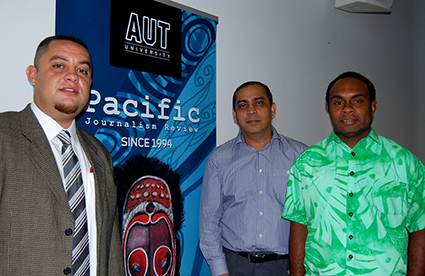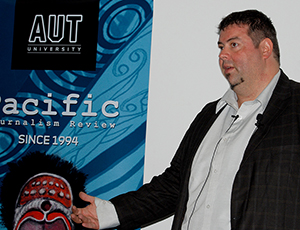
Paul Kendon
AUCKLAND (Pacific Scoop/Pacific Media Watch): A Fiji publisher and media freedom advocate today likened his country’s media and political experience between the 2006 coup and the September elections to the opening lines from the Charles Dickens novel A Tale of Two Cities.
“It was the best of times, it was the worst of times, it was the age of wisdom, it was the age of foolishness, it was the epoch of belief, it was the epoch of incredulity, it was the season of Light, it was the season of Darkness …”
Morris, editor and publisher of Republika magazine and president of the Fijian Media Association, told the three-day Pacific Journalism Review conference news media before the 2006 military coup had been fractured but rules and regulations since had effectively put a “noose around the media’s neck”.
The FMA has been set up by editors and publishers to help address publishing problems in Fiji.
Government officials still had plenty of control over broadcast and print media in the island state.
In spite of a return to democracy, publishing was still fraught with potential problems as advertisers were easily influenced by government and a publisher might lose advertisers overnight if someone in authority took offence to an article or editorial.
This had resulted in the taming of news and little critical analysis, Morris said.
Journalists shortage
Fijian news media faced a shortage of experienced journalists as many had “fled” to New Zealand and Australia.
The FMA hopes to provide ongoing training and support for graduates in order to gradually improve the state of reporting in Fiji.
After Morris’s remarks was a talk presented by Shailendra Singh, former head of the University of the South Pacific journalism programme who is completing a doctorate, about media laws and political journalism in Fiji.
Singh said media law focused on government and its punitive 2010 Media Industry Development Decree.
Previously, before the period of coups, Fiji press freedom had matched that in Australia and New Zealand.
Successive Fiji governments had a history of threatening to toughen laws curbing the media, and The Fiji Times had an early history of opposing multiethnic cooperation during colonial times.
During the 1990s, Fiji embraced traditionalism with deregulation equalling a bolder media which drove state media tensions to dangerous new highs.
All-powerful decree
The Media Decree criminalised what was once an ethical breach and began barring material considered against the “public interest”, “public order”, “national interest” or created communal discord.
The Media Decree was now more powerful than the 2013 Fiji Constitution, but this was open to legal challenge, Singh added.
 West Papua Media editor Nick Chesterfield said reporting in the Indonesia-ruled region was dangerous for indigenous and international journalists.
West Papua Media editor Nick Chesterfield said reporting in the Indonesia-ruled region was dangerous for indigenous and international journalists.
However, the foreign press could challenge and change reportage from West Papua.
Chesterfield called on international reporters to challenge the myth-making which occurred under a controlled media landscape.
He said he had been threatened with espionage charges and other activists have been interrogated, harassed and murdered.
‘Smuggling journalists’
Every week, Chesterfield said he received requests for advice about “smuggling” journalists into West Papua.
“Smuggling in an SD card with information and advice is much easier than smuggling in a journalist. Breaches of government guidelines can result in death, torture, danger and safety problems for sources,” he said.
In 2007, the identification of “rain forest warriors” resulted in the destruction of one village and beatings.
The PJR conference is organised by the Pacific Media Centre to mark 20 years of publishing the media research journal. It is hosted at AUT University and will conclude tomorrow.
Storify file on the PJR conference
This work is licensed under a Creative Commons Attribution-NonCommercial 3.0 New Zealand Licence.




